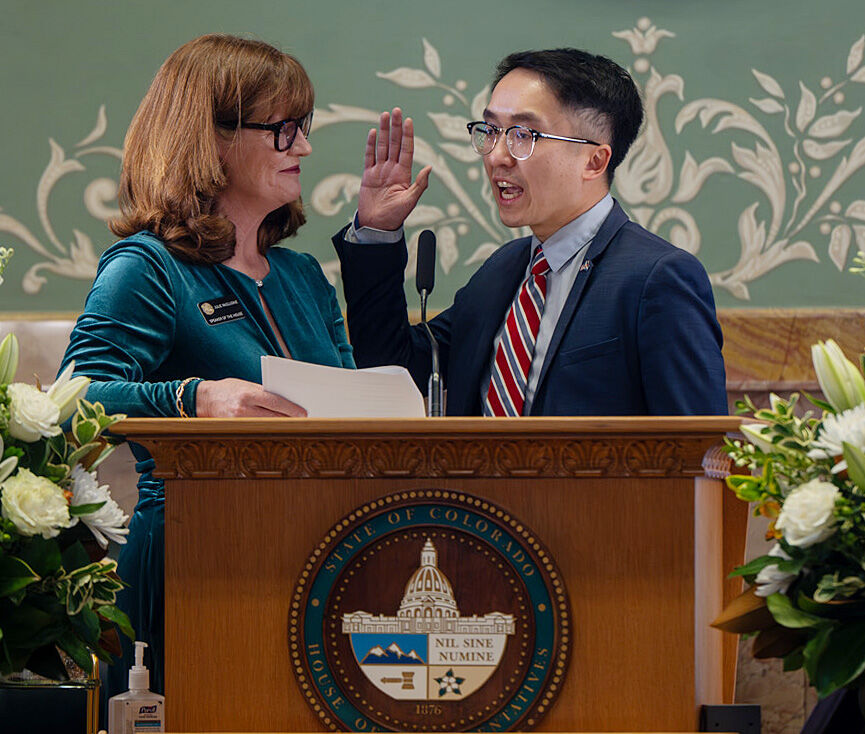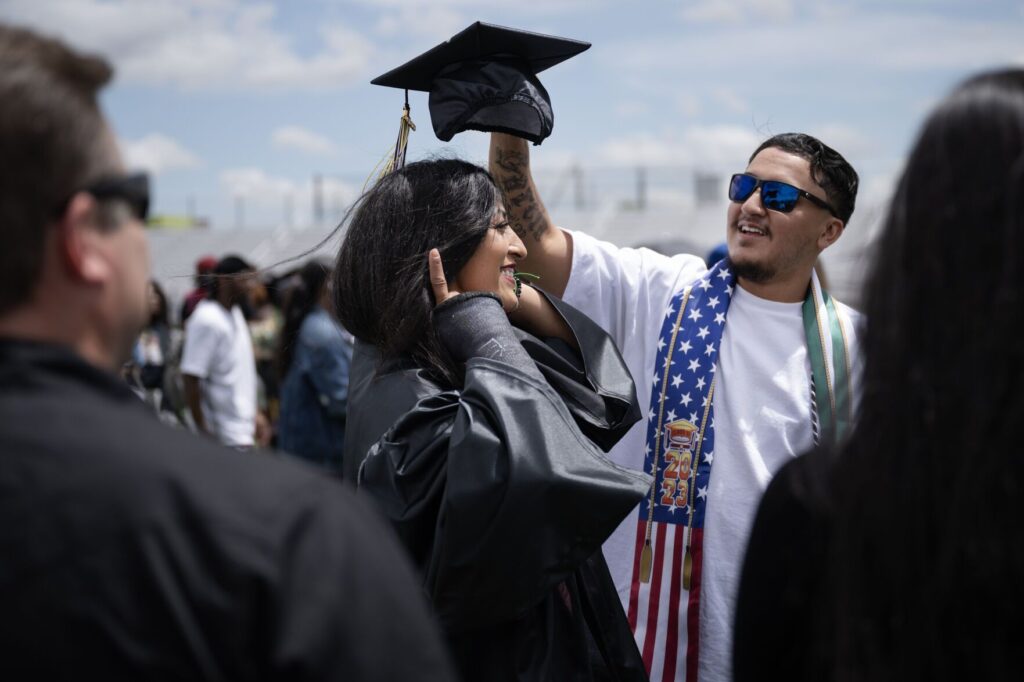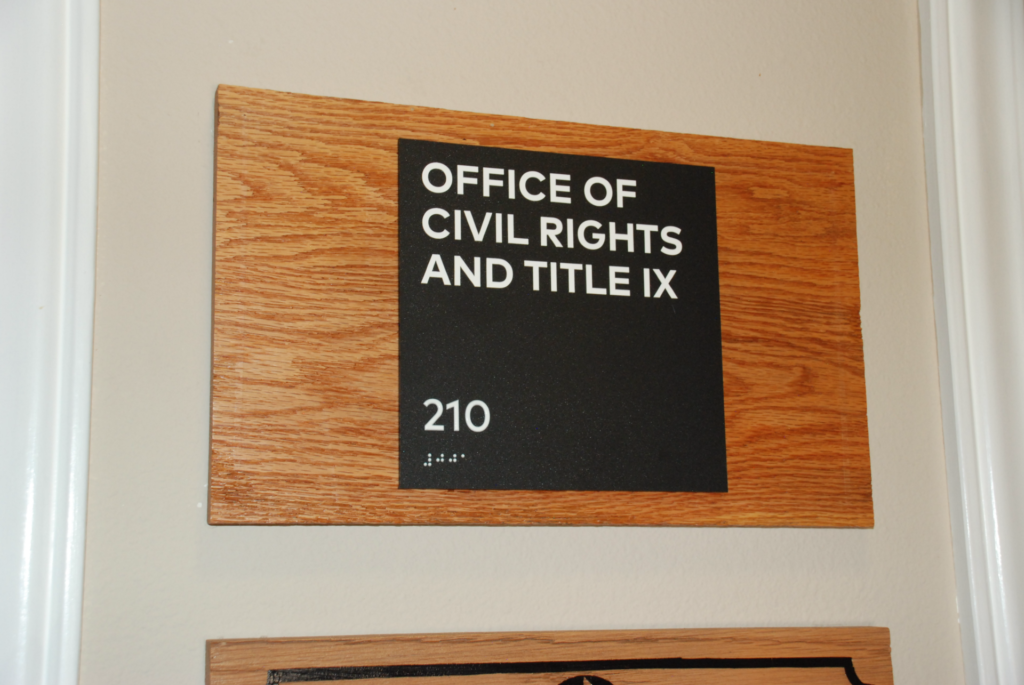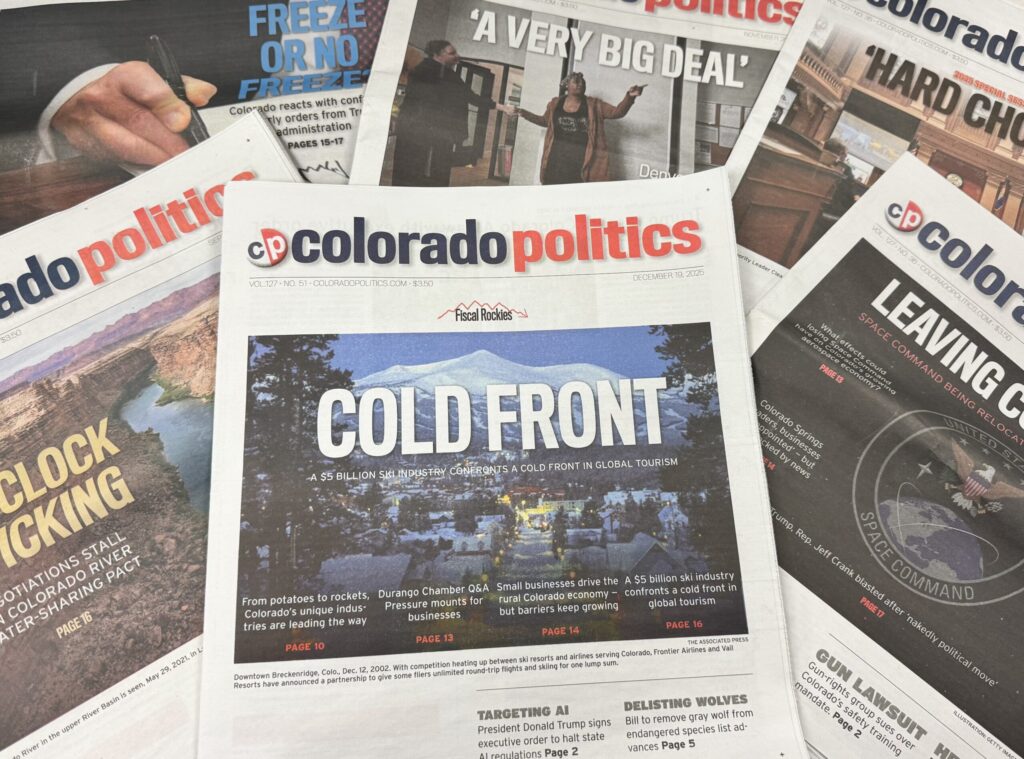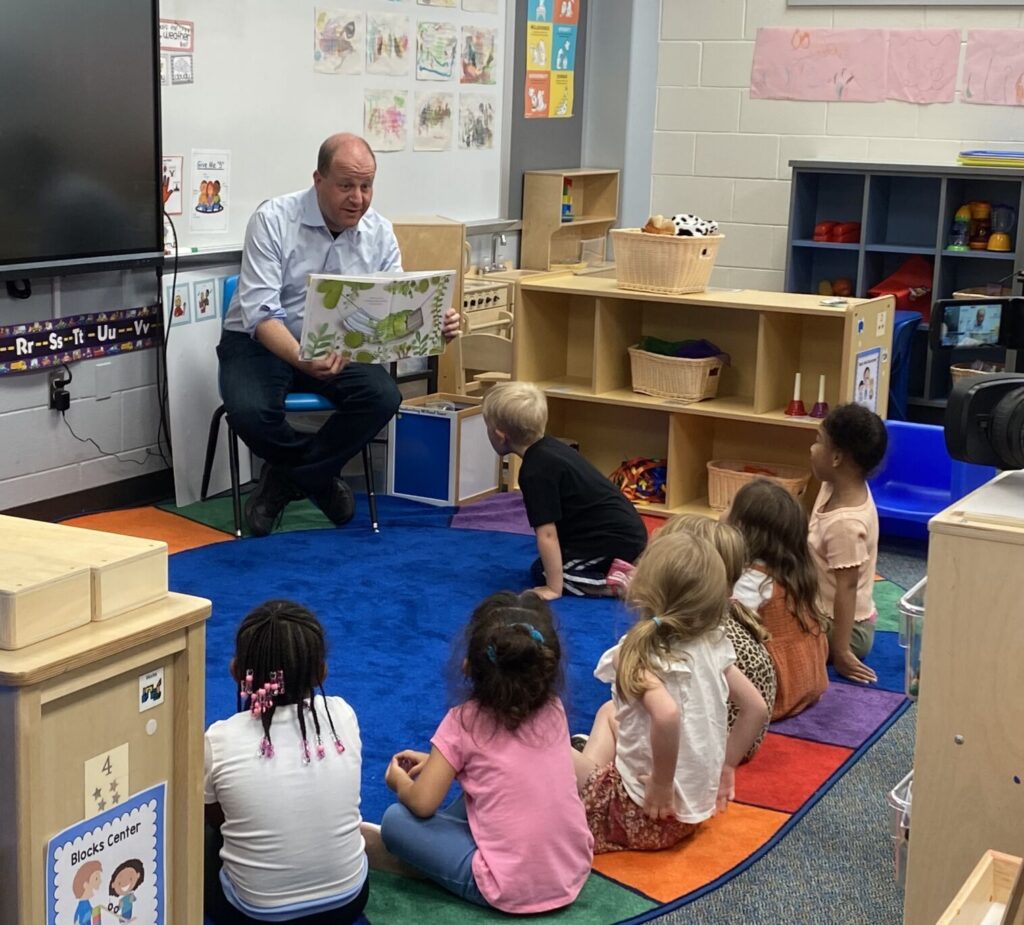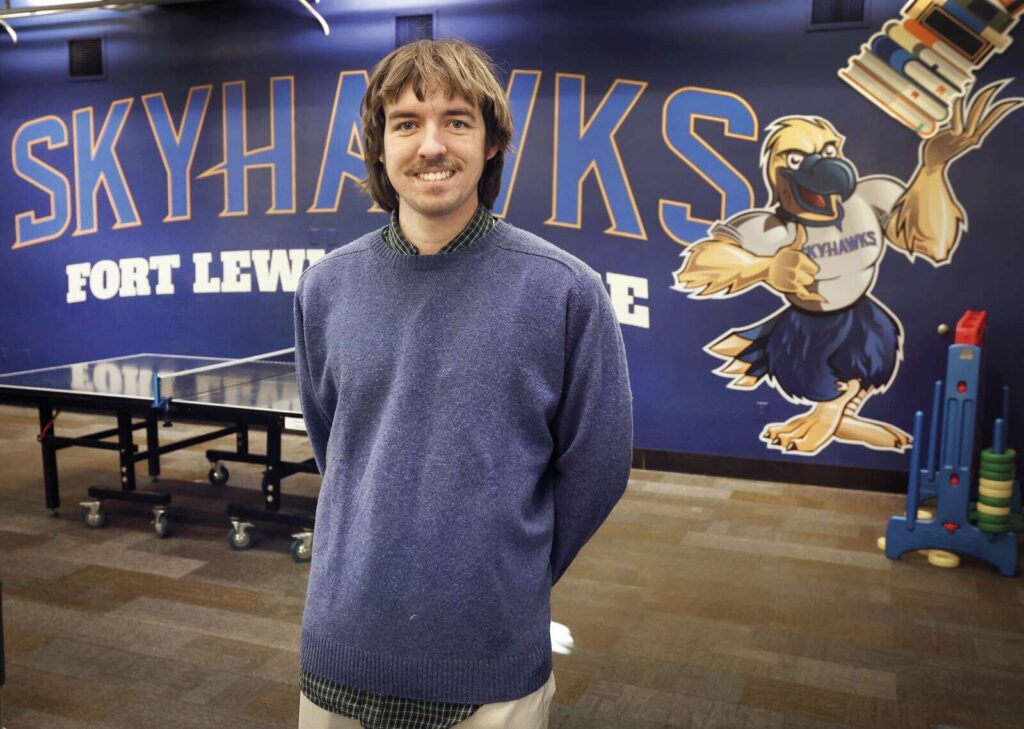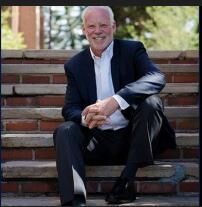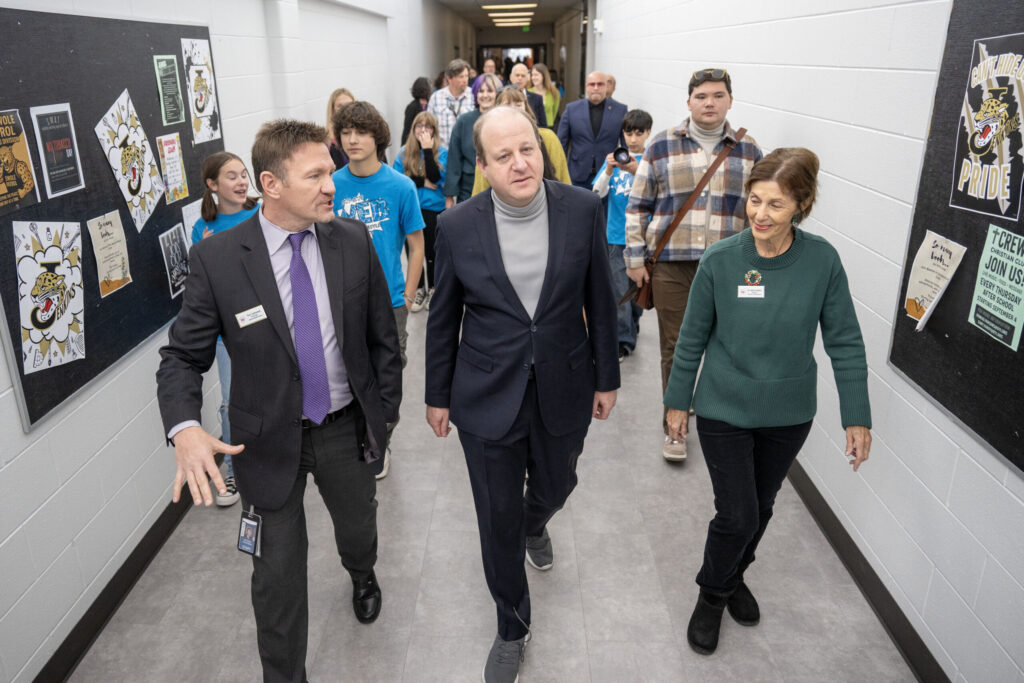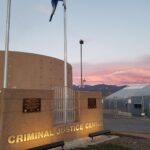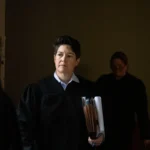Q&A with Courageous Colorado’s Landon Mascareñaz | Nonprofit aims to bring bravery back to politics
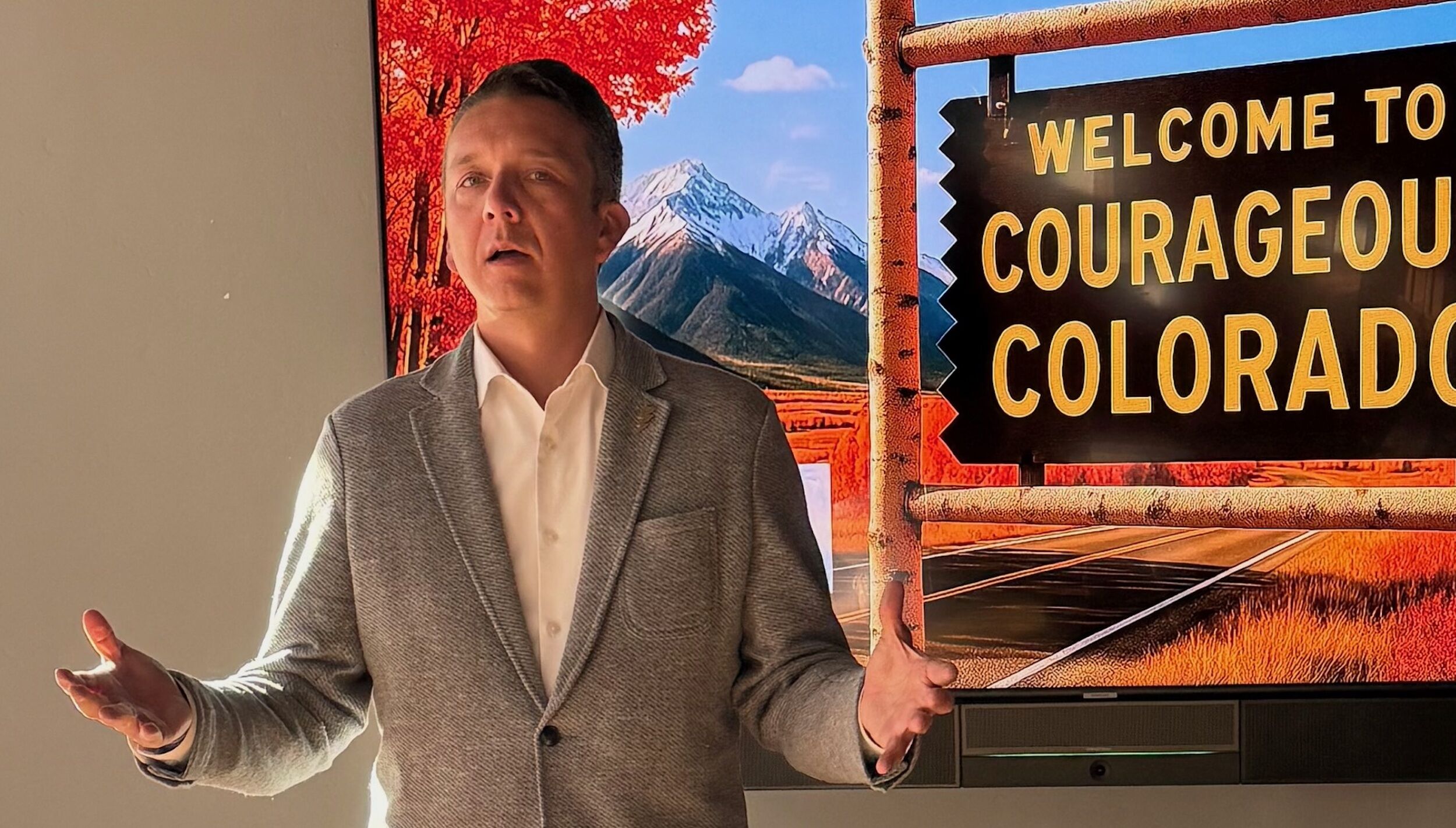
After co-authoring The Open System, a 2023 book about redesigning public education to encourage civic engagement and strengthen participation in self-governing, Dr. Landon Mascareñaz set his sights on invigorating democracy at the local and state level via a nonprofit he founded this summer called Courageous Colorado.
Named after the quality community leaders said was most needed in politics these days, the nonprofit enlisted political veterans from across the partisan spectrum as advisors and partnered with groups devoted to boosting civic involvement, including CiviCO, Veterans for All Voters and the League of Women Voters, and embarked on a 20-stop listening tour across the state.
Mascareñaz, who holds a doctorate in education leadership from the Harvard Graduate School of Education and chairs the Colorado State Board for Community Colleges and Occupational Education, urged Coloradans to envision how they would reform the political process to combat what recent polling shows is plummeting confidence in the system. With the results of the listening tour in hand, the group’s executive director and his staff this month launched what Mascareñaz calls the “activation tour,” a series of conversations in dozens of Colorado cities and towns to tease out possible next steps.
Colorado Politics caught up with Mascareñaz on Oct. 14, between the Courageous Colorado’s meetings in Cortez and Telluride, to talk about his vision and what could lie ahead. Our interview has been lightly edited for length and clarity.
Colorado Politics: What’s your background, and what led you to form Courageous Colorado?
Landon Mascareñaz: I’ve worked on a lot of rural and economic development over the course of my career. Interestingly enough, I’m in Cortez right now, because I actually spent the first part of my career working on the Navajo Nation in New Mexico. And so I was living down here in the Four Corners area. Over the course of the last three to four years, I published a book about the intersection of education and democracy, I started getting really involved in Denver’s effort for ranked-choice voting in city elections, and got connected to a bunch of folks kind of in the democracy redesign space, both nationally and locally. And this past spring, I said, Hey, let’s actually think about this in a much bigger frame.
There are a lot of advocates out there who say, it’s all about ranked choice (voting), it’s all about term limits, it’s all about the open primary. But what if we actually stepped back and had a larger conversation with the communities across Colorado? And that’s what we did this past spring, we had a listening tour.
We went to about 20 places around the state and asked three big questions. First, what does courage and representation in our politics mean to you? Two, if we could achieve it, what would still be the things that you think would hold us back? So we were kind of assessing what people’s sentiments, both cynically and aspirationally, might be about our politics right now. And then, three, we put a list of about 30 potential reforms that state and national advocates think could actually move us forward and asked what do people think are their top five on the list. And then we did the full listening tour.
“But what if we actually stepped back and had a larger conversation with the communities across Colorado?”
— Landon Mascareñaz
We put that all together, and that’s actually now what we’re doing with the activation tour: We’re coming back to communities and saying, “Hey, here’s what we learned on the listening tour.” Because now we’ve got a list of about 10, 12 things that came from that list of 30 possible reforms.
So we’re asking in Colorado Springs, which of these things might be things you want to work on in your particular context? And in Durango, Cortez, Telluride, Gunnison, and Montrose. And it’s actually so interesting, now in the third spot, we are literally seeing a different constellation of potential ideas in every single conversation, which is really a validation of our theory of action, that this kind of statewide play is not as powerful as really meeting local communities where they’re at, because the context is so different.
CP: What kind of things did people tell you they think need to happen? And how did it differ from place to place on your first tour?
Mascareñaz: We came down to this smaller group of stuff, which is still a big list: Campaign finance reform, citizen assemblies, civic education, aligned voting — essentially, getting the municipal, state and federal elections to be aligned, so people are voting less and the turnout’s increased — open primaries, ranked choice, nonpartisan elections, proportional representations. And then what we did is, we created kind of a snapshot for every one of the communities we go to.
In Colorado Springs, the conversation was really around proportional representation, or multi-member districts as a way to hear from every voice inside of a community. They also were excited about the idea of citizen assemblies, where you get a random group of citizens together to take on a real complex, thorny issue that the community is dealing with, and then those recommendations come back to counties or cities. That’s very in vogue across the globe right now, the citizen assembly concept.
In Durango, we had three groups, one on ranked choice voting in the municipal elections. Another worked on election funding — there’s this incredible county clerk of La Plata County who was there, Tiffany Lee, and she had a fellow who was a staffer for her, who’s come up with this amazing idea, to think about a license plate that would generate money for election funding in the state, to make sure we’re doing it. And then we had another group taking on civic education. And then today in Cortez, we had a group on civic education, and then another group on aligning the municipal and state elections. And people really left feeling energized, like, “OK, let’s go work on this now.”
CP: Is there a difference in the tone, how folks were feeling from your first tour that went into this summer, to your second one in the fall here? It feels like the country is in a different place than it was even three or four months ago.
Mascareñaz: You’re totally right. In fact, the (presentation) deck that we use, we try to really capture this moment, because there’s a lot happening in our country right now that is pretty different, right? Quinnipiac had a poll out a couple weeks ago saying eight in 10 Americans believe we’re in a political crisis. We know that a lot of polling for state leaders in Colorado is not looking great recently, either. And there’s a lot of national stuff around political violence and fear of reprisal, so, yes, 100%, there’s a change in tenor, there’s a somberness and a soberness to the conversations.
But fundamentally, the thing that is really inspiring, I think, in these rooms, is that there is a real belief that local change is still very possible. And a sense that actually getting really obsessed about sometimes state but mostly national politics — and particularly at this moment in time — is a one-way door toward not feeling like we can create the change that we know we need, versus thinking, hey, in our local elections, there’s a lot of agency we have as leaders in our local communities to make change. Then if we know that we can do that and can rally other community members around it, that we can get a lot more done locally and put our energy there, and people share that with us literally at the end of each presentation.
CP: Where do you envision Courageous Colorado goes from here, after you complete this tour? There’s a sense it can be real inspiring in the room, but after the meetings, it might not feel sufficient to what’s going on every day.
“We’re going to build this muscle over the long term, because this issue is not going away.”
— Landon Mascareñaz
Mascareñaz: Yeah, it’s like whistling against the wind. This is a real issue. We have a macro political climate that is pretty toxic, negative partisanship. We have major dilemmas — I mean, look, if the Quinnipiac poll is to be believed, 80% of Americans believe we’re in a political crisis, and that’s a pretty big deal. We see our effort at Courageous Colorado as really convening local communities, convening our democracy coalitions across the state, again, in a cross-partisan way. Our board consists of independents, Republicans and Democrats. We really see it as, hey, we’re going to build this muscle over the long term, because this issue is not going away. And you know, my job is to continue the momentum and raise dollars to make sure that happens.
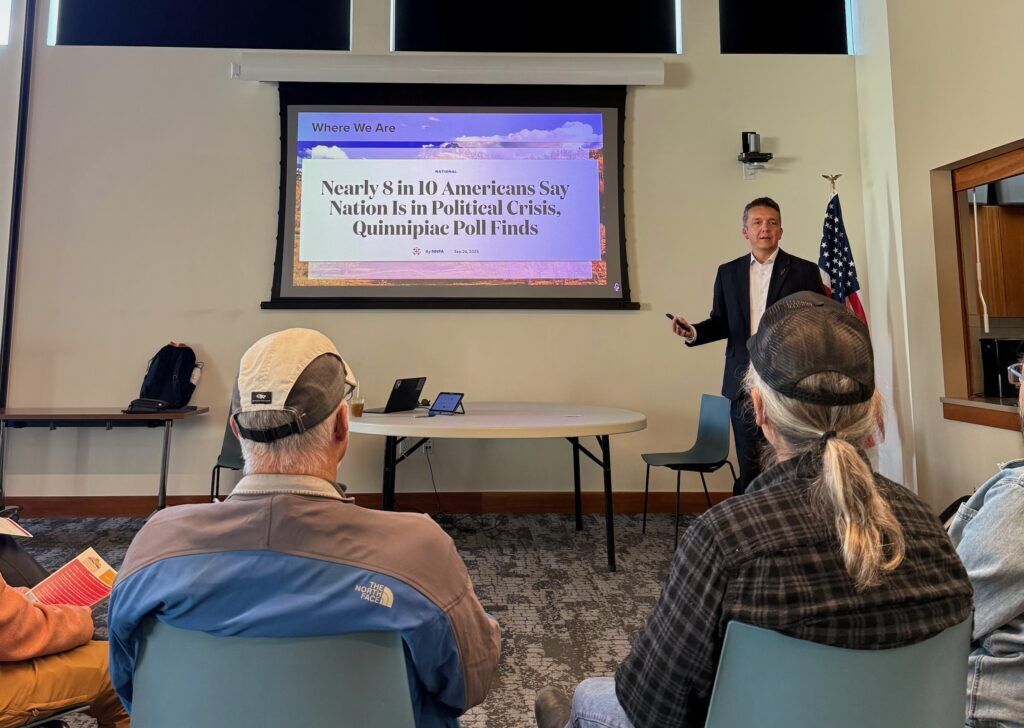
And then, two, look, you know, these things feel really enormous until you actually break them down to the local level, and you can say, hey, we got some stuff done here in La Plata County — in Denver, in Colorado Springs — and we want to channel that energy into action. And we also want to put an affirmative burden back on our political leaders, to say, if 80% of Americans believe we’re in a political crisis, this should be a thing that you, as a leader, have an affirmative obligation to have a solution for, just like housing, education, health care, water. We have to build that as a constituency in the state, to ask that of our leaders.
CP: One of the concerns you said came up in the groups was civic education. There’s a sense that schools don’t teach civics the way they used to, so different generations haven’t grown up with the same expectations about how things work in the public sphere. How do you address that in a way that will make a difference?
Mascareñaz: Well, one of my favorite quotes is, the best time to plant a tree was 20 years ago, but the second-best time is now. So we have to plant a lot of seeds and a lot of trees right now, because we are in this situation. So we know some of these things are going to have short term effect, and some of them will have long term effect.
But as someone who spent most of my career in education, I can confirm that civics education is under-resourced, under-taught, and under-explored as a field for innovation and learning in our schools, and for a variety of reasons, it has been deprioritized. And I think you probably will meet some amazing social studies and civic teachers around the state who are doing really incredible work to build the future of our Colorado civic education. We know it’s not been invested in at the level needs to be. And if we really are looking at this as a civic and political crisis, then we know that we need a cross-partisan, nonpartisan approach to civics education in our schools.
Because we know a lot of young people — the data is pretty clear on this — feel like politics is broken. They see our national politics and feel disengaged. And so how do we help them understand that in their local communities, there are so many ways for them to plug in and make a difference?
“But if we really are looking at this as a civic and political crisis, then we know that we need a cross-partisan, nonpartisan approach to civics education in our schools.”
— Landon Mascareñaz
CP: You’ve said you’re looking at what works in other states, and you discuss this on monthly calls with leaders from various sectors. What have you found that’s working, and is there an opportunity to transplant some of it to Colorado?
Mascareñaz: We know that there are some things that have been done in some other states that have really made a big difference in the way politics works there.
Alaska has essentially a coalition government in its legislature between independents, Democrats and Republicans. What does that tell us about representing all voters in the state? They have some form of ranked-choice (voting) and an open primary. So does Maine. They’ve done some incredible work around clean elections reform in Maine.
We’ve had some amazing work on our democracy in Colorado, thanks to generations of leaders building up our democracy across partisan lines. But we think it’s time to upgrade how we build our democracy, both at the local and state level.
CP: Are you seeing a desire for the kind of reforms you’re talking about? Do you get the sense there’s an appetite for this in the broader population, beyond the folks who show up for your meetings, or is there a sense of fatalism about the question?
Mascareñaz: An important part of this discussion is that we have to see that the leaders and advocates and designers of the solutions are not just people who are the traditional democracy advocates. Those people are essential, they’re leaders who have been driving change in local communities. But we need the tech sector, we need the health sector, we need the education sector. We need kind of leaders in these different fields to say, “Hey, the future of Colorado and the future of our nation depends on me stepping forward with solutions as a part of it.”
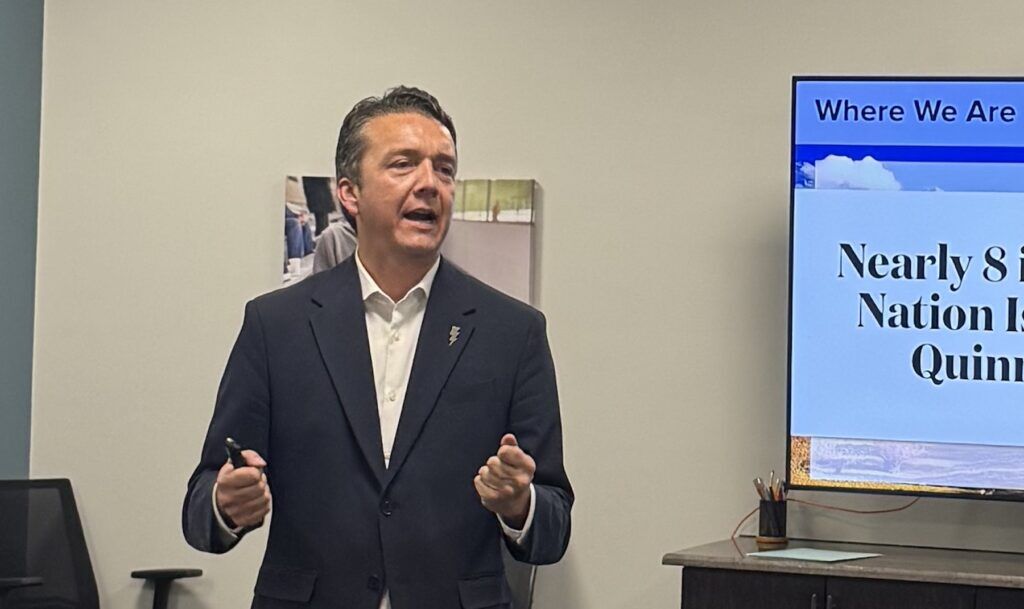
And I will say that in my conversations with folks across these fields, people are hungry for the solution. They’re tired of the perseveration and the kind of doomerism. It’s true, we’ve got some tough problems, but they’re interested in new ways of thinking about this, and they’re interested in working together in different ways. This is a part of what we want to get — we need business leaders in Cortez and Durango and Colorado Springs, for example, to really lean in on some of these pieces. In every one of our communities, we’re making outreach to the chamber, leadership organizations, healthcare leaders, people who sit on boards. That’s a part of our outreach, because we just don’t want to talk to the same traditional groups.
“We need people to have courage to disagree with their friends, courage to reach across the aisle. And we need a politics that incentivizes courageous behavior; it doesn’t disincentivize it.”
— Landon Mascareñaz
It’s true, we’re fighting against the cynicism and the fatalism, but also that’s fundamentally, why we named it Courageous Colorado. Because when we were doing the initial design work, even before we got on the listening tour, that’s the thing we kept hearing from leaders was, put aside all these reforms, all these technical solutions — what’s the thing that we need more of in our society and our politics? Well, we need people to have courage to disagree with their friends, courage to reach across the aisle. And we need a politics that incentivizes courageous behavior; it doesn’t disincentivize it. So how do we kind of reimagine that? And that’s why we’ve taken the moniker of Courageous Colorado forward. That’s the North Star. These technical solutions are a part of it — none on their own are a silver bullet — but collectively, what does it mean to name this as an aspiration?
CP: What can we expect to see on the ground here in the next year, seeing as we’re about a year out from the midterms?
Mascareñaz: I think that there are a few levels that we’re really hoping to see by this time next year. Our goal is that we’re going to have between six to a dozen communities who are working on a very hyper-local, specific thing that makes sense to them to build up their democracy. You’re going to see a coalition of community organizations and state based organizations rallying behind them to get those changes through, whether that’s the aligned elections, ranked choice voting, or term limits in places where maybe that’s an opportunity.
We’re not going to be an organization that just says, “Hey, this is the only thing that matters.” It’s going to be about a lot of different types of reforms that matter for communities. And then a year from now, we could be seeing some of the wins and some of the progress along those lines.
I think at a state level, one of the things we’re really hoping is that there will be that coalition of tech leaders, business leaders, education, health care and artists who are saying we care about the future of our democracy being more courageous. There’s a lot of reforms that we can do to make it happen, and they’re standing up to add their kind of heft and beat behind this work, and it’s very possible that there’ll be discussion in our advocacy coalition around statewide issues, legislative issues and policy issues, whether it’s at the legislature or at the ballot box.
Now we’re not quite there yet, because what we’re trying to do is make sure this is done in a ground-up way, co-created and designed with everyone, so it’s not just prescribed. We have people in our coalition who already have ideas that are amazing, but let’s put them all on the table and think about it, and then think about how we can rally political support behind it.
CP: You just got out of a session in Cortez. What did people say there that surprised you? What? What kind of discussion was there that you hadn’t expected?
“We have to pick things that bring us together, because we’ll start to learn from each other and have conversations together.”
— Landon Mascareñaz
Mascareñaz: There was a gentleman here who was a former city council member, very active in politics here, and he said something that I think really struck me, which was that for too long, we haven’t reached out to those that we don’t feel like were on the same team — in particular, in Cortez, that’s some of the farmer and rancher community. He said, “We have to find things do that, to work with them,” and that we need to actually create diverse coalitions for change.
We have to pick things that bring us together, because we’ll start to learn from each other and have conversations together. And I got a real sense from him that there’s an opportunity. In Cortez, Republicans are at the top of the voter registration, then it’s independents. So, how do they think through some of those pieces to to bring different groups together for what’s possible?
We really don’t see Courageous Colorado as an organization that’s going to lead on the specific efforts in the local communities. We want the local leaders to lead, and then we see our job is to help lift them up, with state resources, local resources, coordination, convening. What we’re hoping is that local leaders take that mantle, and then what we’re doing is just really doing everything we can to make sure they’re successful in getting the resources they need. Because for too long, our political infrastructure has under-invested in local change and prioritized statewide change.
We think that there’s an opportunity for some cross-partisanship at the local level, that is very critical, and it’s also why we’ve built our board in the way we did, with the people we did. We’re trying to hold space for all the discussions. And that’s a tall burden, in this moment in time, but we think it’s critical.



